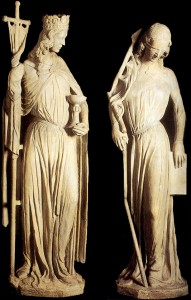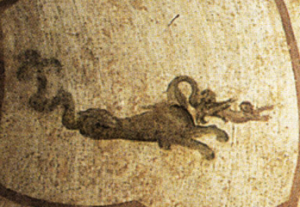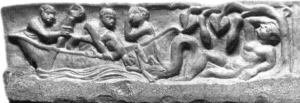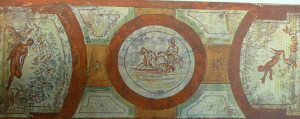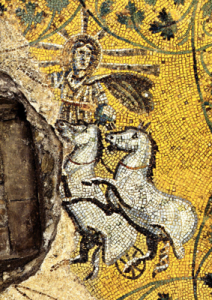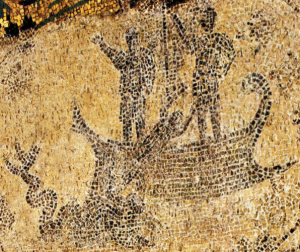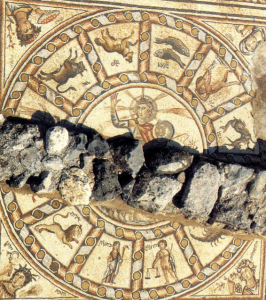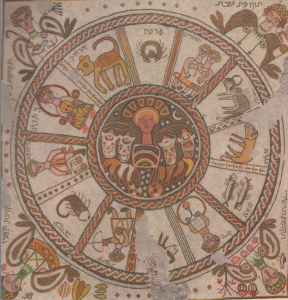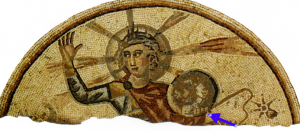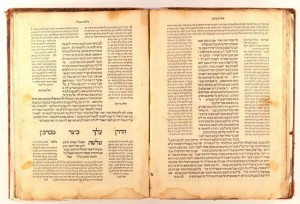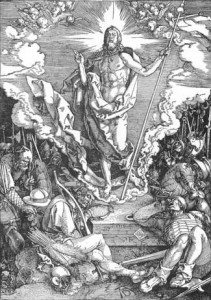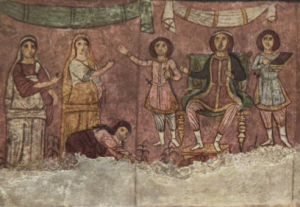
I derive the title of this post from John 7, where Jesus first tells a lie (7.1–10) and later defends his right to heal on the Sabbath (7.20–24; cf. 5.1–15). I would imagine, that for many readers of this post, the first of these transgressions is much more shocking than the latter. Interestingly, though, while Jesus breaks two commandments of the Decalogue he only defends himself against Sabbath breaking. In fact, the evangelist is not at all concerned that Jesus lies.
In this post, I want to briefly examine both transgressions and then offer a hypothetical retelling of the Sabbath controversy, where we replace Sabbath breaking with lying. This will be an attempt to explicate the severity of Jesus’ actions to those who are typically not troubled by Jesus’ actions on the Sabbath.
{Update (7/7/13): When I first wrote this post it seemed to me evident that Jesus was indeed lying. I therefore did not include a defense of this conclusion but simply stated it as fact. I have received a couple of responses challenging my statement that Jesus was lying and, while I have responded to them below, I feel that I ought to provide a formal defense within the post of why I believe Jesus is lying in John 7.
It seems to me that Jesus’ journey to Jerusalem to celebrate Succoth anon after telling his brothers that he is not going to Jerusalem leaves us with two options: Jesus changed his mind or he lied to his brothers. If we entertain the former, we need to find something in the text that reveals (whether explicitly or implicitly) that Jesus changed his mind. Thus, we need to know why Jesus decided not to go. In v. 6 Jesus tells his brothers that the reason does not want to attend Succoth is because his “time has not yet come,” which means it is not time for Jesus to die. Thus, in light of his opposition that is waiting to kill him at any opportunity (v. 1), Jesus’ reason for not wanting to attend Succoth is more than understandable. It is odd, however, that Jesus does attend the festival even though his hour had not yet come (see 8.20) and indeed will not come until the end of his public career (17.1). It does not seem, then, that Jesus changed his mind, for the very reason why he told his brothers he was not attending had not yet occurred.
In order to examine the second option––i.e., Jesus lied––we need to find a motivation to for Jesus to lie. The narrative reveals that there was an opposition to Jesus waiting in Jerusalem in order to kill him (v. 1), thus Jesus can not enter into Jerusalem conspicuously. Although his brothers are probably not intending to enter Jerusalem behind a marching band announcing their arrival, they are also not concerned about stealth. Jesus, on the other hand, wants to remain unseen until his speech. Thus, it is quite plausible that Jesus lied to his brothers that he was not going to attend Succoth so that he could surreptitiously enter Jerusalem on his own (v. 10) and remain their under the protection of his supposed absence (a pretense his brothers would have unknowingly spread).
In the end, the argument that Jesus changed his mind is weakened by the fact that the reason Jesus gave for not attending Succoth is not fulfilled until ch. 17. In other words, there appears to be no explicit or implicit reason in the text for Jesus to have changed his mind. On the other hand, the argument that Jesus lies coincides well with Jesus’ knowledge that his opponents want to kill him, which provides a clear motivation as to why Jesus would have lied to his brothers.}
* * *
Growing up, lying was always considered one of those absolute sins; that is, there was never a time when lying was justified. It’s a sin. Period. You don’t do it. It was also common to play the “what if” game, where we would place ourselves in difficult scenarios, which would engender a discussion about whether it was appropriate to lie or whether the truth was the appropriate response. As far as I remember, 100% of the time, no matter what situation in which we found ourselves, it was always wrong to lie. We justified this by saying that when we tell the truth, we leave matters in the hands of God.
While I am no longer an “absolutist” about the sinfulness of lying, it was still a bit shocking when I came across a lie told by Jesus. In John 7.8, Jesus tells his brothers, “I am not going to this festival, for my time has not yet fully come.” Once his brothers go off to the festival, however, we are told that “Jesus himself also went up [to the festival]” (v. 10).
Jesus certainly has his reasons for lying to his brothers; namely, that he desires to attend the festival secretly, for his time (i.e., arrest/death) has not yet come (v. 6). Regardless of the reasons, though, Jesus is portrayed as a liar. What’s more, the evangelist does not seem to be too concerned about Jesus’ lie. Rather, the evangelist is much more concerned with defending Jesus’ other sin: healing on the Sabbath (7.20–24; cf. 5.1-15; 9.1–14).
Jesus’ healing on the Sabbath was first taken up by the evangelist in ch. 5. Jesus defended his actions by stating that he will work on the Sabbath because the Father works continuously (v. 17). In ch. 7, though, Jesus takes a different approach. He defends himself by pointing out the already established rule that when the eighth day of an infants life falls on the Sabbath it is permitted to break the Sabbath to perform circumcision. Basically, circumcision was determined by the Jewish leaders to be weightier than the Sabbath. So when these two regulations came in conflict with each other, the weightier law (in this case, circumcision) was to be observed. Jesus’ conclusion is that healing someone on the Sabbath is not a sin because deliverance from oppression is a weightier command than keeping the Sabbath.
If you are not a Jew, the fact that Jesus would break Sabbath regulations to heal someone probably does not cause you any concern. However, keeping the Sabbath has always been a hallmark of Judaism. As such, Jesus actions on the Sabbath would come across as shocking and incredible for many Jews. This was certainly true for Jesus opponents in the Gospel accounts.
So why are non-Jews less troubled by Jesus actions on the Sabbath? I can only imagine it is because there is no emotional tie to the Sabbath. Gentiles might be aware of the importance of the Sabbath for Jews but this awareness is nothing more than intellectual knowledge. The Sabbath does not significantly impact the lives of gentiles.
Lying, on the other hand, has a more significant impact. For many Christians (and Jews?) lying is a sin that is never justified. If this is the case, I would argue that if these Christians want to get a better understanding of how unimaginable Jesus’ Sabbath actions would have been to those around him, perhaps it would be worthwhile to replace “Sabbath” with “lying.” As mentioned at the beginning of the post, this is a hypothetical scenario. Nevertheless, it bears some veracity because we have already seen that Jesus does tell a lie.
If we insert “lying” in place of “Sabbath,” then in John 5 and 9 Jesus delivers a man from oppression by lying. (Perhaps a fitting scenario would be that the man is being oppressed and Jesus lies about his whereabouts in order to deliver him from his oppressors. There are certainly other occasions in the Scriptures where someone lies to deliver someone from oppression and in return are blessed by God because they are doing his will [Exod 1.15–21; Josh 2]. More recently, those who lied to protect the Jews from the Nazis would be an appropriate illustration.) To put this in an accusatory form, Jesus is a liar. If this strikes you as blasphemous, then you get the point. It would be similar to the accusatory statement, Jesus breaks the Sabbath. One might respond that, “God would never command someone to lie; thus, clearly a man who lies can not be from God.” Now your starting to react like Jesus’ opponents (9.16). For Jesus, though, his actions are not his own, but those of the Father (4.34; 5.17, 19–22, 30, 36; 8.28; 10.25, 37; 14.10; 17.4, 14). Thus, Jesus is vindicated when he breaks the Sabbath and when he lies, for God has commanded him to do both.




 His argument rests on two major observations: 1) Scholars have not often distinguished between the forbidden and allowed paradigm and the clean and unclean paradigm. 2) Christianity is not, as has traditionally been thought, an anti-Jewish movement. It is a movement from within Judaism and is in opposition to a current view within their religion (that of the Pharisee’s).
His argument rests on two major observations: 1) Scholars have not often distinguished between the forbidden and allowed paradigm and the clean and unclean paradigm. 2) Christianity is not, as has traditionally been thought, an anti-Jewish movement. It is a movement from within Judaism and is in opposition to a current view within their religion (that of the Pharisee’s).